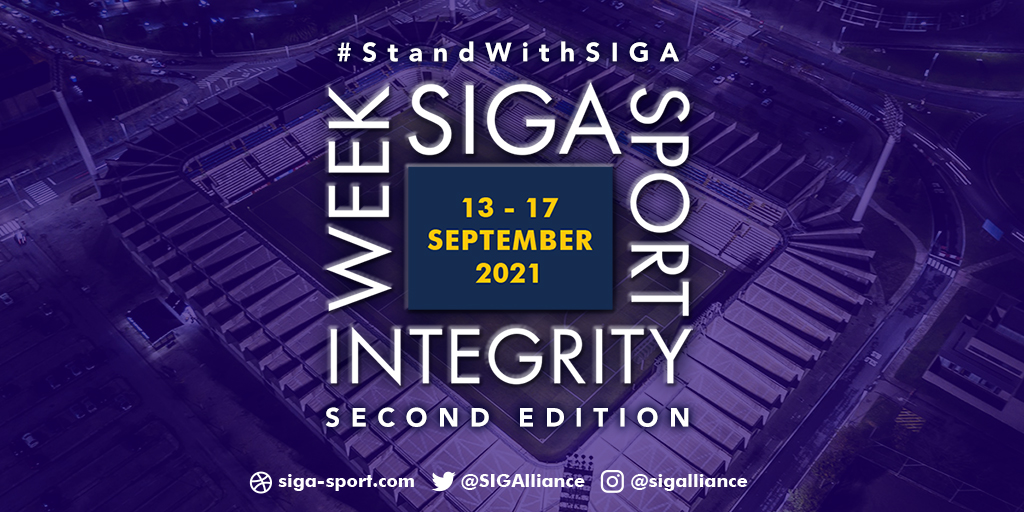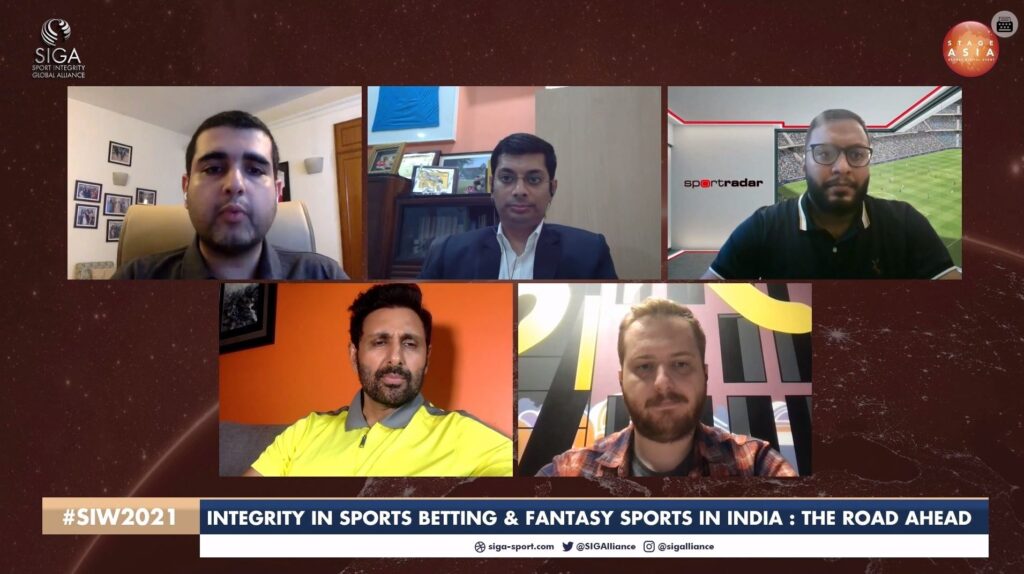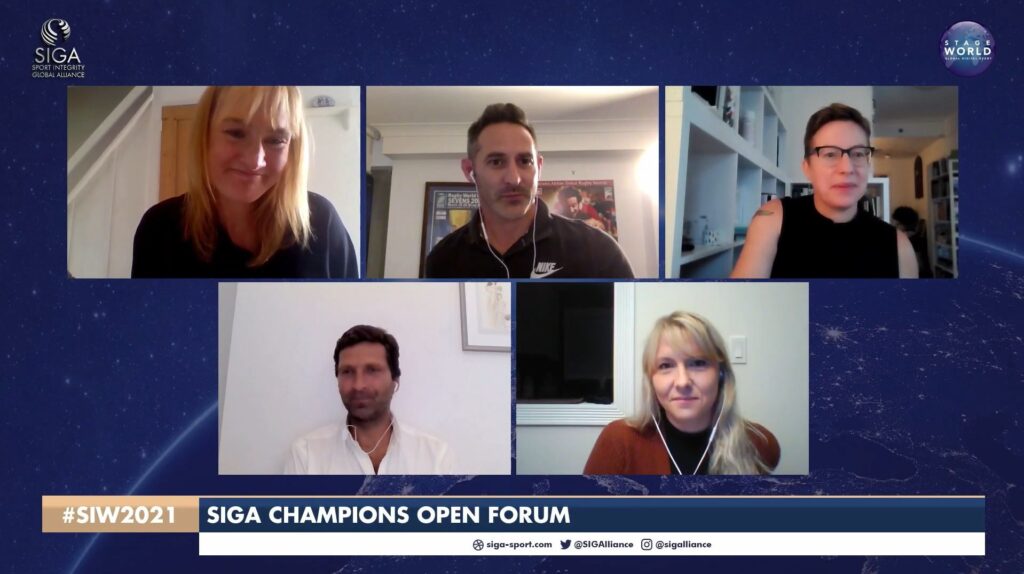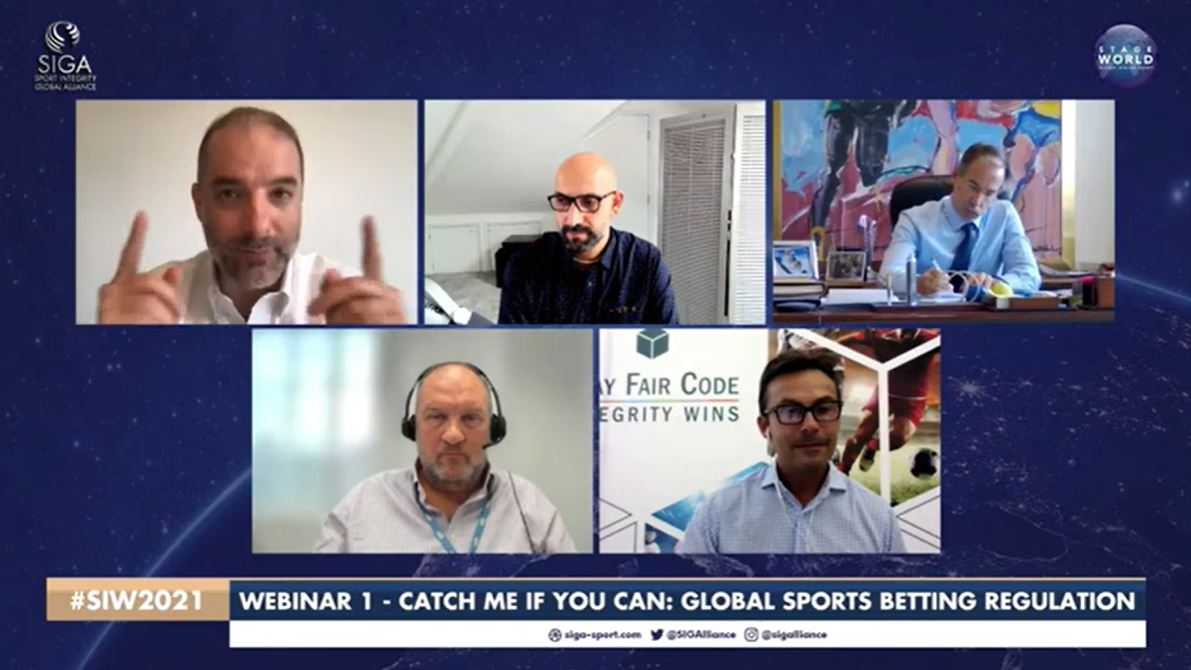The topic for day 3 of SIW2021 was Sports Betting Integrity. Stage Asia, with “Integrity in Sports Betting and Fantasy Sport in India: The Road Ahead” set the tone for great panels, with important conclusions and unanimous consensus on the need to regulate.
Don’t miss the chance to watch on-demand.
Integrity in Sports Betting & Fantasy Sport in India: The Road Ahead
(Watch here)
India is currently undergoing a fantasy sports boom, and is one of the largest markets for online sports based competition. With the legalisation of betting being considered actively, several global betting companies are already establishing their footprint in-market. This session focused on the current reality of the ecosystem, the key integrity issues associated with the same and what the future may hold for Indian sport. It was also discussed the impact on players and the integrity ecosystem that is needed to keep sport clean and fair, in the light of a commercial boom around fantasy and betting.
Vidushpat Singhania, Managing Partner, Krida Legal
“We have an elephant in the room. In India, there is no robust regulation, no gambling commission regulating the license providers. That is the biggest challenge we have now: we have games of skill and games of chance. Games of chance are prohibited unless licensed. Fantasy sports is seen as a game of skill. Therefore, it is functioning without regulation. It is functioning as an exception under the gaming act, whereas sports betting has to be regulated. In India, only two small states have actually licensed sports betting. They don’t have any gambling commission, so the first challenge is to create a uniform regulation for any sports betting it is state by state. Also, taxes are very high in India: 30 per cent income tax on winnings, plus 28 per cent for the service. What we found is that most of the betting was taking place in the illegal and unregulated sector”.
Dmitry Belianin, Chief Marketing officer, Parimatch International
“The number one challenge is the education of the audience. The indian market is emerging, it’s very new, and most people don’t understand either fantasy sports or sports betting. For most of them, this is purely a way of earning some money, even if it’s a form of entertainment for the others. The second challenge is trust. I think that this is the outcome of the lack of the education, because people feel that sports betting may be rigged, that their money is going to be stolen. There are dishonest operators and those are killing the reputation of other brands in the market. Another challenge is the lack of proper regulation, and I think that on top of that you have a poor user experience.”
Parvin Dabas, Owner, Pro Panja League
“Sport Integrity cannot be mandatory, it has to be a necessity. It’s not something that can be an option. First of all, the concept of sports integrity has to be a necessity that has to start from the ground up. We have our ear to the ground as far as what questions are consumers asking. Education is critical right now. We need to educate the future consumers of sports betting, because they do have a lot of questions. Regulation is still to come in, and there is a gray market. When there is a grey market, things are a little murkier. At Pro Punjab League we have started building an ecosystem to make sure that everything is OK, because Sport Integrity is at its very foundation. After all, the moment anybody even smells a little lack of it, it’s the beginning of the end.”
SIGA Champions: Open Forum
(Watch Here)
Four SIGA Champions jumped from the pitch to the Sport Integrity Week 2021 stage for an open conversation about Sport Integrity. Listening from experienced high-level athletes and coaches was fascinating, and their panel provided great insights to the audience. From the negative effects of doping and lack of gender equality to the transforming power of Sport, no pressing issue was forgotten.
Ben Gollings, Director, B10 Coaching
“Looking back now, I see Sport influenced me from a work ethic perspective, the team dynamic, the camaraderie. It also taught me discipline and dedication into what I wanted to achieve. Sport has has lived with me and it’s those values. As a youngster iI experienced the the highs and lows and the positives and the frustrations with sport, as everybody does. You can’t hide from that, but it’s how you channel all of that and make it work for you in positive ways. Sport has such a great influence in how you can positively influence lives throughout whatever age group you’re coaching from. Sport has such a big impact on society and communities, both big and small, that we want it to be the right role model, and to be a healthy environment for all to come in and participate. That’s where Integrity comes”.
Cameron Myler, Clinical Assistant Professor, New York University
“Sport has had such a profound impact on my personal and professional life. When I was first competing on the national team in luge I was 15 years old. I was quite young, was traveling the world and competing in World Cup and World Championship races. There was still East Germany and the Soviet Union, and those women were about my height and 20 kilos heavier than me. I thought they were training really hard, and my teammates were saying they had a really good doping program! I experienced other people cheating, and that had direct impact on my results. I competed in an environment where there were individuals who were not complying with the rules. Now I sit in the position of judge and decide those cases, but I’m a neutral. I’m here to hear all the evidence and make a decision: In sport there is a focus on protecting clean athletes, and we know doping is never going to go away, but we need to do you know everything. Sport organisations need to make sure that those athletes who are playing fair are protected.”
Kylla Sjoman, Innovate Team, Creating Legacies 17 / Coaches across continents
“Growing up in canada I obviously had a lot of opportunities in many senses, but professional sport didn’t exist for female athletes, or female soccer players at the time. I had, however, the chance to be coached by strong female women, so I had someone to look up to. I stuck to the values of what is having female role models, and find those pathways of where sport can take you. Those experiences really shaped me. When I was presented with the possibility of being a professional player, after moving to Europe I started to see the inequalities that existed with men and women’s sport. It made me really passionate about gender equality”.
João Tralhão, Football coach
“A coach is a teacher, and sometimes we are in the position that we need to be a straightforward person. You need to say the truth to all of the athletes, to all of the students. Sometimes it’s hard to be truthful, sometimes it’s hard to be honest, and to help them understand what they are doing and what could be the future. You need to be truthful, but you need to motivate them to keep going, That’s one of the hardest tasks for as, as coaches or teachers. Integrity means you need to be honest, and sometimes that will hurt. But in the long term, it’s the best solution”.
Catch Me If You Can: Global Sports Betting Regulation
(Watch Here)
The sports betting global landscape continues to evolve at fast pace. Globalisation adds a layer of complexity, however, technological advancement has been a gamechanger. Reassuringly, with Malta’s blockade to the 2014 Maccolin Convention being lifted, this a legal instrument and the only rule of international law on the manipulation of sports competitions gains a new life, so progress is expected. Similarly, more and more organisations are continually dedicating resources to tackle the mounting global threats against the integrity of sport. However, are governments, international organisations and sport doing enough? Do we have a truly robust, coordinated, concerted global regulatory approach, or fragmentation and silos are still the dominant scenarios? Are governments, sports governing bodies and competition organisers investing enough on the integrity of sport? Where does the investment go, and is it as impactful as it could be? This panel illuminates the evolution of regulations and tactics that are driving a paradigm shift from reactive to proactive policy and concerted action to make a lasting and tangible difference to this highly complex and difficult aspect of global sport. This panel provided an eye-opening portrayal of where we currently stand in this global fight.
Affy Sheikh, Head of Starlizard Integrity Services
“International platforms are particularly important in the area of match fixing, as this is not a national phenomenon. It doesn’t happen within defined borders, because it’s organized crime, and organized crime groups move from one country to another. We’ve seen acts of match fixing stretch across several countries and if you look at where it happens and where the bets are placed, you realize it’s a huge transnational phenomenon. We must take a more centralized approach across the board, when it comes to actually not only having the governance side and the regulatory framework in place, but also to look at how investigations are run”
George Mavrotas, Secretary of State of Youth and Sport, Greece
“The manipulation of competitions has become one of the major threats in sport, along with doping, and the violence of any kind. Match-fixing poisons the head of the game, and it creates dubs and suspicion instead of drama and excitement. It is clear that the sport movement alone cannot deal with this global problem. The alliance of the sport movement, the governmental organizations, law enforcement and betting authorities are necessary to deal with this problem. Our efforts must be to try to attract more countries to ratify the Maccolin Convention”.
Jonny Gray, CEO, International Tennis Integrity Agency
“We look to all the players: the betting industry, the regulators, governments and other stakeholders have to collaborate and cooperate to protect the integrity of sport, Sport can’t do it alone, and in some ways we are the victims of manipulation and corruption which undermines confidence in our product, it undermines the trust in clean sport, which is so important. We have no equivalent to Anti-Doping on Anti-Corruption”.
Severin Moritzer, CEO, Play Fair Code
“While other speakers on this panel are coming from the investigation/intervention side, it’s our call to come from the prevention side. What we basically do is that we jump into the brains and minds and hearts of the athletes, of the coaches, of the stakeholders in sport, and give them information about match-fixing and integrity in sport, with the clear idea behind that kind of prevention and education workshops to make them aware of what is at stake”.
– END –
ABOUT SIGA
SIGA is the world´s largest coalition in the field of sport´s governance and integrity. Supported by more than 100 international multi-industry supporters, SIGA is an independent and neutral organisation whose mission is to bring about meaningful reforms and enhance the integrity of all sports through a set of universal standards operated by an independent and neutral body. SIGA is the only organisation to bring together sport, governments, academia, international organisations, sponsors, business, rights holders, NGOs and professional services companies, from every region in the world, around a common cause of fostering greater integrity throughout sport. Click on the hyperlinks for the list of SIGA Members and Committed Supporters and SIGA Partners.
For more information on SIGA, including its vision, mission and reform agenda, please refer to the website: www.siga-sport.com. To contact SIGA, please email: comms@siga-sport.com.
Find SIGA on Twitter at https://twitter.com/SIGAlliance,
Instagram at https://www.instagram.com/sigalliance/?hl=en
LinkedIn at https://www.linkedin.com/company/sigalliance/.




